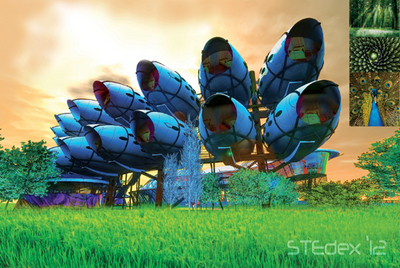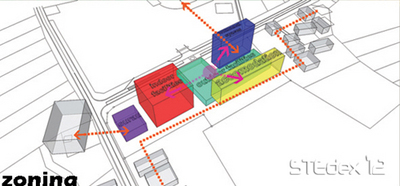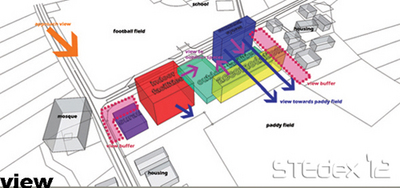Wan Mohamed, Wan Srihani and Ismail, Ida Suriana and Abd Zubiar, Ahmad Helmy and Bakar, Norasnani (2012) Unorthodox Living Husk. Sustainable Tropical Environmental Design Exhibition 2012, 4. pp. 176-177. ISSN 2180-0685
Abstract
Words that are used to physically describe both schemes produced by Helmy and Norasnani namely pod, case, shell and capsule have many similarities at first glance. In spite of that, both schemes have set different programmes and conceptual design strategies behind it to illustrate their interpretation of Youth Leadership Camp. “Sufism” is known as the act of total abandonment of desire for divine presence seemed to capture Helmy’s thoughts through these husk-like structures. Those small tapered cocoons have created meditation and sleeping spaces giving tranquility through smooth curved interior walls. Generosity in the public and private spaces has led the whole scheme to be spread across the whole site as if it is about to invade adjacent paddy fields. Majority of the structures are raised from the ground on stilts to retain the purity of the natural environment and connect human activities in it. Norasnani’s simple intention in creating an understanding of various religious backgrounds in this multicultural society has influenced her to impose the curvilinear form on a rigid grid pattern. This represents amusing and stimulating spaces that, despite the inflexibility of structural presence, can still be accommodated. The introduction of different sleeping positions using hammocks has led the designer to experiment and give attention to finding multiple-functional structures to be used. Both playful structures emerged as floating spots amidst the paddy field in a kampong setting. So, the boldness of both designers to unite softscape within and underneath the building structures has palliated such imposing form in response to site context.
Actions (login required)

![[img]](http://stedex.upm.edu.my/206/3.hassmallThumbnailVersion/Unorthodox_Living_Husk_02.jpg)

![[img]](http://stedex.upm.edu.my/206/7.hassmallThumbnailVersion/Unorthodox_Living_Husk_06.jpg)

![[img]](http://stedex.upm.edu.my/206/8.hassmallThumbnailVersion/Unorthodox_Living_Husk_07.jpg)



